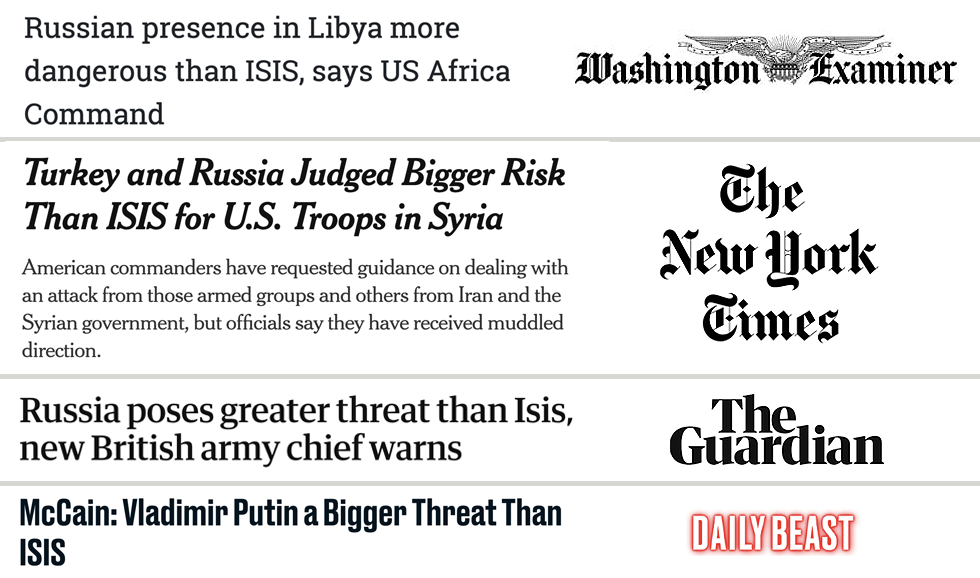Amid pandemic, Pentagon pushes ‘Russia more dangerous than ISIS’ fear porn – and not for the first time
Perhaps desperate to distract Americans whose lives have been upended by the coronavirus, US Africa Command is trying to argue for a return of its troops to Libya – because Russia is a “bigger” threat than Islamic State terrorism.
While the headline in Wednesday’s Washington Examiner literally spells out “Russian presence in Libya more dangerous than ISIS, says US Africa Command,” that quote does not actually appear inside the story. It is instead paraphrased by Abraham Mahshie, who appears to be the outlet’s Pentagon reporter.
Nor is it made by the actual AFRICOM, but rather an unnamed “defense official.” The article does quote an AFRICOM spokeswoman at one point, to make a general observation about Russian private security contractors operating in Libya.
Topping it all off are “expert” observations by a scholar who spoke at a forum organized by CSIS, a Washington, DC think tank notoriously hawkish on Russia.
I bring this up because of the conclusions reached in this Washington Examiner article that cites the #HearsayMafia#GossipGirl round table and is an absolutely wild conclusion when you look at the maps above and what is going on with China in Africa. https://t.co/c9tve5ANFy
— Shannon (@Avery1776) April 29, 2020
The anonymous Pentagon official claims that Russia’s interests in Libya are “mineral extraction” – meaning, oil – and strategic port access “on the southern flank of NATO.” The CSIS lecturer concurs, saying Russia is interested in both Libya and Syria for the sake of their oil, and that contractors working for Wagner – a private security company repeatedly accused of presence in both countries – are providing President Vladimir Putin with plausible deniability.
The whole thing reads like a mishmash of opinion disguised as fact and impossible-to-verify insinuations by nameless sources, all strung together to look like Moscow has nefarious designs on Libya that simply require AFRICOM to ride in to the rescue like a white knight.
“We believe that there will be a need in the future, an opportunity for us to get back into Libya again, but it’s a little difficult to answer that given the current crisis ongoing there and uncertainties that we're seeing in Libya,” the anonymous official is quoted as saying, just after Mahshie puts into his mouth the claim that “Russia’s presence in Libya is even more dangerous than the threat posed by ISIS remnants operating in the south.”
Also on rt.com Libya’s Haftar ‘accepts people’s will’ to rule, declares UN-brokered unity government deal ‘thing of the past’Even a casual observer of events in the Middle East and North Africa over the past decade, however, can quickly conclude this is a severe case of psychological projection. It was the US and NATO “humanitarian intervention” that turned Libya into a chaotic hellhole back in 2011, encouraging the jihadist ‘rebels’ to overthrow the government of Colonel Muammar Gaddafi. Some of those rebels later joined Islamic State (IS, formerly ISIS/ISIL) in Syria or closer to home. Less than a year after the ‘revolution’ these militants killed four Americans – including a US ambassador and two armed contractors – in Benghazi.
As for oil, it is the US that currently occupies oil wells in Syria, in direct violation of international law. Russia doesn’t need Libyan or Syrian oil, since it’s a major producer and exporter itself. Besides, the coronavirus pandemic has collapsed demand, driving oil to under $25 a barrel.
Let’s not even mention that General Khalifa Haftar, who controls most of Libya and has declared himself the legitimate ruler of the country – and whom the media at one point have dubbed a ‘Russian stooge’ – spent decades living just outside the CIA headquarters in Virginia, as a prominent defector from Gaddafi.
One of the side effects of the US military having the world carved up among its combatant commands is that they constantly compete for resources, and tend to use the press and the think-tank racket to gin up fear and hype so they can get more funding and attention from Congress. A string of EUCOM chiefs has done so by crying about Russia, especially as the Obama administration focused on Africa and the Middle East. Now that President Donald Trump has tried to scale back US military presence overseas – US troops were ordered out of Libya in April 2019 – it’s AFRICOM’s turn to cry Kremlin and let slip the dogs of war.
Hyping Russia as the existential enemy worse than ISIS is somewhat of a tradition in the West as of late, too. The Examiner reporter and his Pentagon source are hardly the first to do so. A similar headline appeared in the New York Times back in December, referring to Syria – and was likewise not backed by the copy below.

In November 2018, the newly appointed top British General Mark Carleton-Smith actually called Russia “indisputably… a far greater threat to our national security” than Islamic terrorists. And who can forget the late unlamented Senator John McCain, who claimed back in May 2017 that while IS “can do terrible things,” it was Russia that “tried to destroy the fundamental of democracy” by supposedly changing the outcome of an American election.
That claim, which McCain helped push as fiercely as Hillary Clinton and the Democrats – or perhaps even more – was debunked by the very investigation set up to prove it. One doesn’t need another Mueller ‘Russiagate’ probe to see that the Examiner and AFRICOM’s fear-mongering amounts to nothing just as well.
The statements, views and opinions expressed in this column are solely those of the author and do not necessarily represent those of RT.















